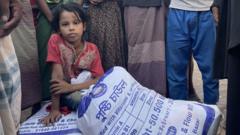In January, 17-year-old Kajol contracted tuberculosis, a potentially fatal disease particularly prevalent in impoverished areas of Bangladesh. Her situation worsened when aid from the U.S. Agency for International Development (USAID) was abruptly terminated by the Trump administration in February, leaving her treatment incomplete. In Bangladesh's capital, Dhaka, where Kajol supports her family working in a garment factory, the sociopolitical climate continues to deteriorate, with slum areas like Mohammadpur being disproportionately affected.
Local initiatives, like those led by Dipa Halder from Nari Maitree, played a critical role in combating TB by providing free testing and treatment. While USAID had been instrumental in identifying and treating tuberculosis cases—curing over 296,000 in 2023 alone—the funding cuts have jeopardized such progress. With the government’s free medication often inaccessible, on-the-ground support is vital, making the loss of outside assistance catastrophic.
The reductions in aid have far-reaching implications—not only for health services but also for employment. Nari Maitree’s Stop TB Program, along with 113 other USAID-funded initiatives, has been suspended, resulting in massive job losses in the NGO sector, as expressed by Mr. Asif Saleh of BRAC, who stated that the impact is severe, leaving many without a means to support their families.
As the humanitarian crisis deepens, particularly in Cox’s Bazar—the world’s largest refugee camp housing over a million Rohingya fleeing persecution—the ramifications of US aid cuts become more apparent. With international support diminished, essential services have been reduced to emergency care, increasing the vulnerability of community members who rely on foreign aid for survival. Issues such as food shortages, inadequate water sanitation, and rising diseases complicate the dire conditions even further.
Support mechanisms that once sustained vulnerable populations have been compromised. Many, like Rohingya refugee Rehana Begum, face the prospect of starvation as emergency provisions decrease drastically. Amidst a backdrop of political instability and an economy struggling with inflation, the interim government’s promise of a strategic response lacks substance, leaving citizens concerned about their future wellbeing.
Experts articulate that the devastating consequences of USAID cuts will reverberate throughout Bangladesh, placing countless lives at risk and contributing to a growing humanitarian disaster. As the community grapples with these pressing challenges, the urgency for comprehensive support and rebuilding is clearer than ever, against an optimistic outlook presented by policymakers who downplay the significance of the lost assistance.
Local initiatives, like those led by Dipa Halder from Nari Maitree, played a critical role in combating TB by providing free testing and treatment. While USAID had been instrumental in identifying and treating tuberculosis cases—curing over 296,000 in 2023 alone—the funding cuts have jeopardized such progress. With the government’s free medication often inaccessible, on-the-ground support is vital, making the loss of outside assistance catastrophic.
The reductions in aid have far-reaching implications—not only for health services but also for employment. Nari Maitree’s Stop TB Program, along with 113 other USAID-funded initiatives, has been suspended, resulting in massive job losses in the NGO sector, as expressed by Mr. Asif Saleh of BRAC, who stated that the impact is severe, leaving many without a means to support their families.
As the humanitarian crisis deepens, particularly in Cox’s Bazar—the world’s largest refugee camp housing over a million Rohingya fleeing persecution—the ramifications of US aid cuts become more apparent. With international support diminished, essential services have been reduced to emergency care, increasing the vulnerability of community members who rely on foreign aid for survival. Issues such as food shortages, inadequate water sanitation, and rising diseases complicate the dire conditions even further.
Support mechanisms that once sustained vulnerable populations have been compromised. Many, like Rohingya refugee Rehana Begum, face the prospect of starvation as emergency provisions decrease drastically. Amidst a backdrop of political instability and an economy struggling with inflation, the interim government’s promise of a strategic response lacks substance, leaving citizens concerned about their future wellbeing.
Experts articulate that the devastating consequences of USAID cuts will reverberate throughout Bangladesh, placing countless lives at risk and contributing to a growing humanitarian disaster. As the community grapples with these pressing challenges, the urgency for comprehensive support and rebuilding is clearer than ever, against an optimistic outlook presented by policymakers who downplay the significance of the lost assistance.























